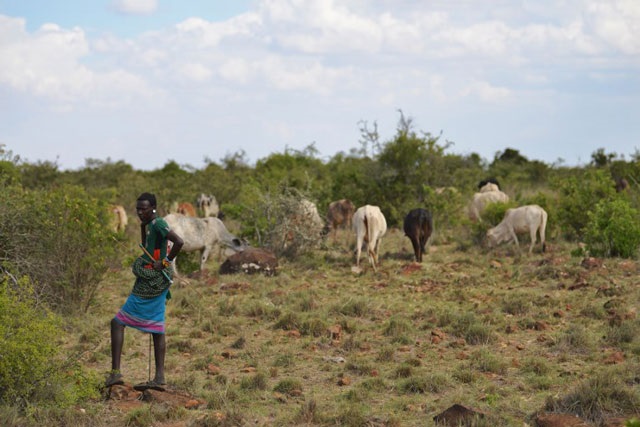
Kamwenje, Kenya | AFP | Footsteps came first, then unfamiliar voices, the smell of cow dung and the kicking in of the front door.
Suddenly awake, John Mbogo wrapped his 11-year-old daughter Tabitha in his arms and rolled under the bed. His wife, Anne, crawled next to them, eyes wide.
Torchlight fell on the now empty beds and they saw naked legs smeared in manure, a “shuka” blanket rolled at the waist and the muzzle of a gun.
“There was nothing I could do but hide,” said John, recounting the June invasion by armed herders, dressed for battle, at their small family compound in Kamwenje, a mostly ethnic Kikuyu settlement in Laikipia, high on the eastern rim of Kenya’s Rift Valley.
Such raids have become common in recent months in the counties of Laikipia and neighbouring Baringo, with pastoralists invading private land, raiding homes, burning property and driving livestock into farms.
But where the government blames bandits, victims see political intrigue.
Kenyans vote in a general election on August 8. The unrest echoes the politically motivated ethnic violence that has prefaced almost every election since multiparty politics was introduced a quarter of a century ago.
Since voting in Kenya tends to follow ethnic lines, evicting different tribes so that another can dominate a constituency is a pragmatic political strategy.
“They want to drive us away so that they can take over our land,” says John, who has farmed a vivid green field of maize in Kamwenje since 1997.
His family’s clothes, food and possessions were stolen during the attack, but others have suffered worse: neighbours have been raped and shot. Some have already fled.
– ‘Politics is fuel of chaos’ –
The raiders come from the Pokot tribe, pastoralists for whom cows are at the heart of social life. Cattle raids serve as a test of manhood as well as a way to get rich and gain enough cows to pay for a wife.
The easy availability of illegal weapons means that cattle raiding has grown more violent, while poor rains and large herds prompt pastoralists to roam further in search of adequate pasture.
But the spike in attacks ahead of elections and their brutality has locals convinced that grazing is not the main motive.
“This is not about pasture. This is politics,” says Paul Njoroge, a 53-year-old father of four, farmer, paralegal and Kikuyu community leader.
“The motive is to evict the farmers and own everything. Politics is the fuel of this chaos.”
Njoroge has lived and farmed on a ridge above Kamwenje since 1983. Currently, he sleeps alone at night, his family, like others, has become what he calls “day scholars”: working the farm by day but staying with neighbours at night where they feel safer, a few miles further from the county boundary.
Residents say that barely a night goes by without gunfire, an ambush or a home invasion.
On worn sheets of folded notepaper Njoroge keeps a running tally of murders, rapes and thefts. So far, Njoroge said, more than 40 families have chosen to leave and he wonders how much longer the rest of them will hold out.
The future Njoroge fears can be found 28 kilometres (17 miles) due west and 1,000 metres below Kamwenje, deep in the belly of the Rift Valley, in Eldume, a forlorn settlement of hundreds of stretched tarp tents.
The more than 700 people living here are the surviving ethnic Ilchamus population of the nearby village of Mukutani.
 The Independent Uganda: You get the Truth we Pay the Price
The Independent Uganda: You get the Truth we Pay the Price


